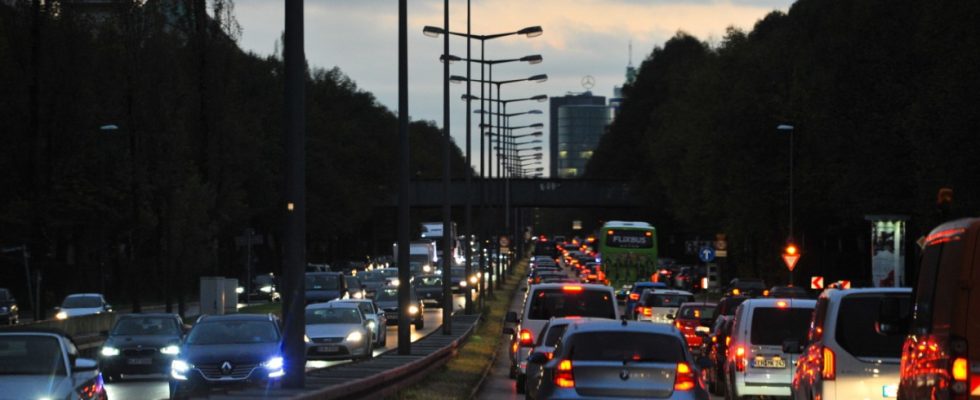Significantly stricter air pollution control limits are set to apply in the European Union from 2030. Negotiators from the European Parliament and the member states agreed on this on Tuesday evening. And the city of Munich would then have a new problem: the limits for nitrogen dioxide (NO₂) would then be violated again at many measuring points. It is still unclear whether the city will therefore impose new driving bans on diesel cars. However, the city could face lawsuits for compensation.
The new rules still have to be officially approved by the EU states and parliament, although this is considered a formality. From 2030 onwards, the limit values for pollutants will be roughly halved. For NO₂, the limit for average annual pollution is to be reduced from the current 40 micrograms per cubic meter of air to 20 micrograms. The permissible annual average value for fine dust – with a particle size of ten micrometers per particle, i.e. PM10 – drops from 40 micrograms per cubic meter to 20 micrograms; for the even smaller fine dust particles PM2.5, a target value of ten instead of 25 micrograms will apply in the future.
Munich has complied with fine dust levels since 2012. In 2023, the measuring point on Landshuter Allee, which is the most polluted, reached 19 micrograms for PM10 and a value of ten for PM2.5. With the new rules, fine dust would also become scarce again. When it came to NO₂, Landshuter Allee was again significantly above the current value last year at 45 micrograms, and 42 micrograms were determined at the new Moosacher Straße measuring point. Once the new limit values apply, the annual average values would be exceeded at 29 of 59 measuring points.
The German Environmental Aid (DUH) and the Verkehrsclub Deutschland (VCD) have already filed a new lawsuit against the city with regard to the currently measured 45 micrograms. As a reminder: Since 2021, the municipalities themselves have been responsible for air pollution control in Bavaria; a lawsuit brought by the associations against the Free State has now been directed against the city.
The case will be heard before the Administrative Court on March 14th
In a settlement, it was agreed on a three-stage diesel driving ban in the environmental zone expanded to include the Middle Ring. However, the city council suspended its tightening to a second and third level, whereupon DUH and VCD went to court again. There will therefore be a hearing before the Administrative Court on March 14th. The future rules for air pollution control are also too lax for the DUH. The World Health Organization (WHO) had even suggested significantly lower limit values.
From 2030 onwards, the city could face new legal disputes. The EU decision stipulates that citizens suffering from air pollution will be able to sue for compensation in the future.
In view of the traffic, politicians – depending on the party – hope for measures, help or sufficient transition periods.
(Photo: Robert Haas)
The ÖDP in the city council is therefore calling for significantly more drastic measures. This includes, among other things, free public transport within the Middle Ring, and the city should also promote air purifiers in particularly polluted areas. “The hut is burning in Munich,” says ÖDP parliamentary group leader Tobias Ruff. “Landshuter Allee is still the dirtiest street in Germany. The EU’s new limits will take effect in six years, and yet the Green-Reds have still not woken up.” The city is not even able to comply with the “loose limits” from 2008 and is putting the health of its citizens at risk. In general, without giving a specific example, the ÖDP calls for a “fundamental change in strategy” for air pollution control and quick, effective measures.
Florian Roth (Greens) explains: “Health comes first: Accelerate the transport transition, expand alternatives to cars, promote the switch to lower-emission motor vehicles – this is now more than ever the task of responsible politics.” SPD parliamentary group leader Anne Hübner said Munich has been trying to improve air quality for years and has already had success here.
Significant challenges for German cities
“However, the new EU limit values will present major German cities with considerable challenges,” said Hübner. “It’s not just car traffic that will have to accept restrictions. We are now waiting for implementation into German law and hope for support from the federal government and appropriate transition periods so that we don’t get to the point where a lot of people can no longer use their cars.”
Manuel Pretzl, parliamentary group leader of the CSU/FW, believes that nationwide compliance with a limit of 20 micrograms by 2030 is unrealistic. “The air has been getting better and better for years – even without driving bans, by the way – but six years is not enough,” says Pretzl. “The municipalities are being left alone with a problem that they cannot solve on their own. We are calling on the mayor to take action against this tightening at the federal level.”

